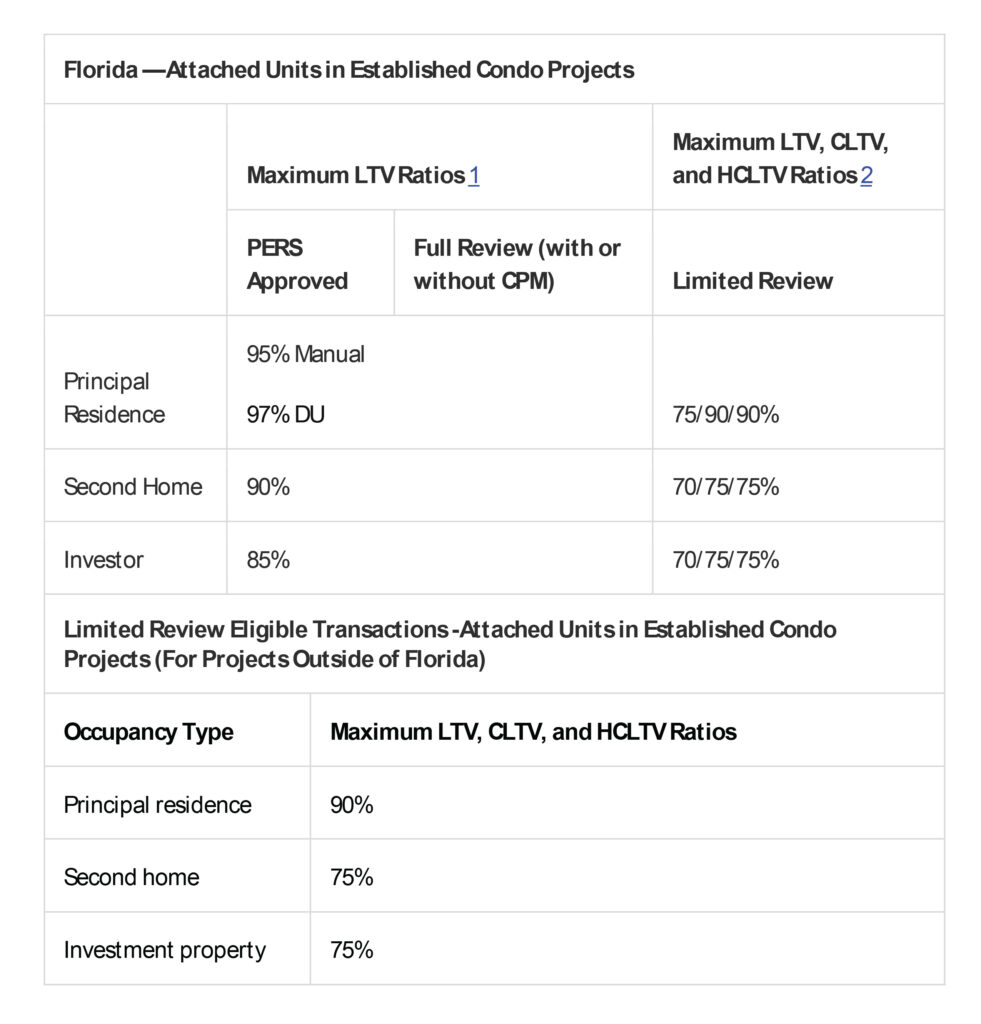Florida is a unique geographical area where attached condominium units are scrutinized by investors more than any other state.
If you are thinking about buying a condo in Florida and would like to apply for financing. There are several special financing requirements you want to make sure you understand.
How Fannie Mae Looks at a Condo Florida
Fannie Mae Fortune 500’s 24th largest US corporation, based on revenues, places special loan to value restrictions on Condominiums in Florida. They incorporate two condominium review processes to evaluate a condo’s eligibility and maximum loan to value – the limited review process and full review process. PERS (Project Eligibility Review Services) is a list of pre-approved projects by Fannie Mae that do not require either review process and are already Fannie Mae approved.
The Limited Review Process
The limited review process is most lenient of the two review processes and requires the ‘Short Form Condominium Questionnaire’ to be completed.
Limited review transactions are typically deemed ineligible for the following reasons (exceptions do apply):
- Inadequate insurance
- Active or pending project level litigations surrounding construction, building safety, or large settlements that the condo’s master insurance policy will not be able to cover.
The Full Review Process
A full project review requires the ‘Full Form Condominium Questionnaire’, homeowner association financials, and the condo’s operating documents to be reviewed.
Full review transactions can miss out on eligibility for several reasons, the most common of which are:
- Annual reserve allocations do not meet the minimum 10% requirement. (this is extremely common)
- Inadequate insurance
- Active or pending project level litigations surrounding construction, building safety, or potential large settlements that the condo’s master insurance policy will not be able to cover.
- Issues in the condo’s operation procedures
Which process do you qualify for?
While condo loans originated in every state but Florida, require a 10% down payment to move forward with a primary residence ‘limited review’ transaction, Florida requires a 25% down payment.
The two charts below highlight the differences:

As you can see, condos that qualify for the ‘Full review’ or have a PERS approved designation qualify for standard conventional loans – as low as 3% for a first-time homebuyer. However, if the condo is deemed ineligible for the full review process but eligible for the limited review process you are required to bring at least 25%. There are, however, creative financing options that allow for a lower down payment.
CLTV – Combined Loan to Value
As documented in the chart above there is a way to finance a principal residence limited review condo in Florida with only a 10% down payment – however, it takes two loans.
Combined loan to value or CLTV is an expended loan to value ratio that calculates the loan to value of all loans issued to a single property. This means if you have a first mortgage of 50% loan to value and a home equity line of credit for an additional 20% loan to value, your combined loan to value is 70%. The same idea applies when qualify for condo financing.
With a maximum eligible LTV for limited review condo financing at 75%, and a maximum CLTV at 90%, you can combine a first mortgage at 75% with a home equity line of credit (or other second mortgage) at 15% for a combined loan to value of 90%. Lendz will allow you to close both of those transactions simultaneously meaning you only would have to come to the table with a 10% down payment.
Similar restriction applies to Non-QM and FHA Loans. Check back to our blog or contact us directly to find out how Non-QM and FHA financing handles condos.
*HCLTV stands for high combined loan to value and unlike CLTV this comparison considers any funds you have access to – for example, your second mortgage is a HELOC, your balance is $100,000, and the line amount is for $200,000. The HCLTV would use the full $200,000 unlike the CLTV which would use the $100,000 balance in it’s calculation.

